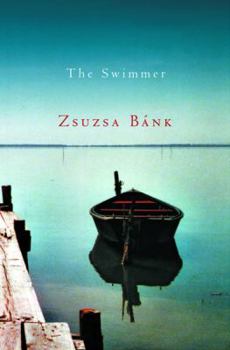The Swimmer
Select Format
Select Condition 
Book Overview
Hungary, 1956. Without a word, Katalin leaves her family and sets out for the West. Her husband, Kalman, abandons the family farm and begins a long and circuitous journey through Hungary with his two... This description may be from another edition of this product.
Format:Hardcover
Language:English
ISBN:0151009325
ISBN13:9780151009329
Release Date:January 2005
Publisher:Houghton Mifflin Harcourt
Length:278 Pages
Weight:0.99 lbs.
Dimensions:8.3" x 1.0" x 5.8"
Customer Reviews
2 ratings
Interesting but missing relevant details
Published by Thriftbooks.com User , 15 years ago
As a writer myself, I was caught up by the fact that there is no dialogue whatsoever in this book. This is unusal for a brand new writer, such as Zsuzsa, to be able to get published. Not to mention win an award. Maybe in Europe the world of writing is different. The story is of course intriguing. Especially to someone raised with Hungarian immigrants, only in the U.S. I was touched by the characters. Mostly the children, and some of their relatives. Though I found that much of the story was missing. I really didn't understand the mother/father relationship. I do empathize with the Eastern European male stubborness (anal retentive emotions) displayed by the father. But I wanted to understand his pain a little more. I was suprised that there was really nothing at all about the mother's or father's role in the revolution. I guessed there wasn't one, but there was not much said about her political beliefs. We are left to figure it out, and assume. Since the refugees I knew didn't say much, it is hard to really know these answers, as to why they chose to cross the border. Even though it may seem obvious, it really isn't. The passionate feelings of one person is never the same as another. I did get a sense of what it was like for people escaping, and I appreciated this input. I cried for a specific reason toward the end, but I won't say why and give it all away. The book provided some peace in my mind, coming full circle in a way, but it also left me with many questions and curiosities. As a Hungarian, you must read it, simply because it is beautiful and touching. What is left out is not a reason to walk away.
"When the clock struck the hour, there was something almost mocking about it."
Published by Thriftbooks.com User , 20 years ago
Zsuzsa Bank, in her debut novel, accomplishes a remarkable feat. She writes a novel with virtually no plot, yet she makes us care about her characters and their lives. It is 1956 in Hungary, a time of rebellion and upheaval, and Katalin Velencei, wife of Kalman Velencei and mother of young Kata (about eight) and Isti (about six), has abandoned her family without a goodbye and taken off for the west. Devastated by the desertion of his wife, Kalman, a man who once loved swimming, now spends hours in a trance, staring at a picture of his wife, sometimes unable to recognize his children. "We called it 'diving,'" Kata says. "We'd ask each other, Has Father come back from diving?" Packing up the children, Kalman moves them in with a series of friends and relatives, constantly moving throughout the country, keeping the children out of school, and offering them no sense of stability. "It was as if someone had dropped Isti and me into syrup and forgotten about us," Kata remarks. Lonely and longing for her mother, Kata begins to steal letters from other people's mailboxes. Isti memorizes train schedules. When it is time to start school, they pack and move again. Isti starts sleeping with his eyes open, hides in the woods all night, and stays outside in the winter until he turns blue. Time becomes meaningless--every day blends into the next with little or no change. Bank divides the novel into a dozen separate sections, each one describing life from the point of view of one of the people in the novel--Kalman, Katalin (the missing mother), and the various characters who play roles in the lives of Kata and Isti as they move from family to family. The "excitements" in their lives--seeing snow, riding in a car, visiting a train station--are ordinary events, of interest only because they break the monotony. Bank's simple, clear style features staccato sentences which complement the abrupt movements of the children from place to place. Images, usually connected to mundane details, are presented matter-of-factly--Isti chewing a bite of cake so loudly "we could hear his teeth clicking"; Kata feeling as if "we were living on a spinning top, on the pointed end where you turn it and then let it go..." The stories of the characters' lives, so rooted in the ordinary, take on particular poignancy as they come to represent the lives of legions of other people who, through the accident of war or rebellion, find their lives uprooted, their families torn, their homes vanishing, all sense of "normalcy" evaporated. Ultimately, Bank's recreation of the reality of two young children (and by extension the Hungarian people) achieves a universal significance which, for many readers, may transcend plot. n Mary Whipple






